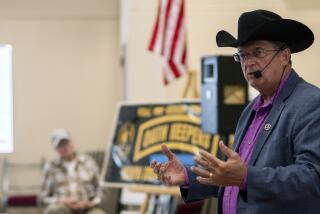On Earth Day’s 40th anniversary, a different world
When millions of environmental activists gathered on college campuses and in major cities 40 years ago for the first Earth Day, the rallies, teach-ins and organizing helped galvanize action on a historic scale — including passage of the Clean Air and Clean Water acts and creation of the Environmental Protection Agency.
But even the most optimistic organizers of Thursday’s anniversary celebrations in Los Angeles, Chicago and other major cities — and the major rally scheduled in Washington on Sunday — might concede that there’s little immediate prospect of matching such watershed achievements.
The political climate has changed, with a battered economy making it harder to build support for policies that could raise prices, cost jobs or slow growth. Today’s issues — global warming, ocean pollution, carbon-based energy systems — are more abstruse and remote. And environmentalists’ opponents are far better organized than in the past.
In 1970, says Denis Hayes, who left graduate school to coordinate the first Earth Day and who is now engaged in planning the event’s 40th anniversary celebration, many business leaders and others who squared off against environmentalists “were caught a little off guard.”
Now, with the focus shifting to global warming, the opposing sides are so evenly matched that it’s unclear whether climate legislation has a realistic chance of passing Congress, even with President Obama’s support.
This week, Hayes answered questions about the Earth Day movement over the last four decades, as well as what he hopes will be its legacy: action on climate change, which he calls “the most important issue facing humanity.”
Q: What’s different about Earth Day and the environmental movement today versus 40 years ago?
A: In 1970, the stuff we were mobilizing people around was obvious. You could see it, smell it, taste it.... The big issues that remain now are things that are largely impossible to detect unless you have sophisticated instruments. They’re things like climate change and ocean acidification — big issues, but not something you can see affecting your children.
Q: Is that why we see polls today showing public concern waning on environmental issues, and skepticism of global warming growing? Do you worry about that?
A: Not at all. Polls are like taking a snapshot from a full movie.… In the first Earth Day, we didn’t have any polls. We didn’t have any focus groups. We were doing what we thought ought to be done, and seeing if the public wanted to come along with it.
Q: The senators pushing the climate bill hardly ever talk about climate anymore. They’re selling the bill on jobs and security....
A: The business here [in Washington] is to assemble a coalition that will get you 60 votes.... My sense is you need to change the politics [so that members of Congress are more concerned about climate change].
Q: How can your rally in Washington do that?
A: The way that American politics is currently operating, regrettably, is that intensity often matters more than breadth [of support].... We need to mobilize people who will say, “If you’re wrong on climate, we need to get someone else into that seat.”
Q: From what you know about it, how do you rate the climate bill that Sens. John F. Kerry (D-Mass.), Lindsey Graham (R-S.C.) and Joe Lieberman (I-Conn.) plan to announce next week?
A: [Since Kerry and Sen. Barbara Boxer (D-Calif.) introduced an early draft last year], every subsequent change has weakened it and weakened it and weakened it, until you have a bill with enough votes, but it’s not really worth anything.
Q: So is this bill worthless?
A: I certainly prefer Cantwell-Collins [a bill that would cap greenhouse-gas emissions, sell emissions permits and refund most of the money to taxpayers] … the only argument I’ve heard against that bill is that it can’t pass. What we want to do is make it so it can pass.
More to Read
Sign up for Essential California
The most important California stories and recommendations in your inbox every morning.
You may occasionally receive promotional content from the Los Angeles Times.










